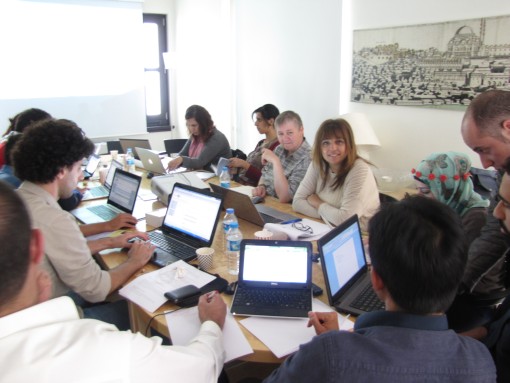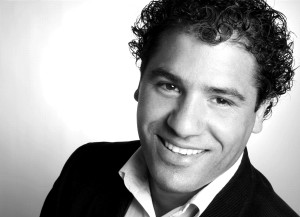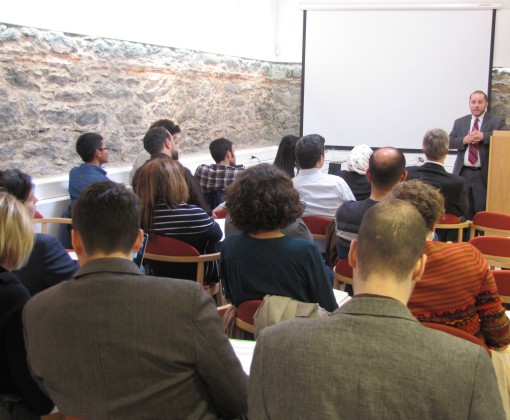October in Istanbul saw the launching of a cooperative project that is extraordinary in many ways. The one-year master’s programme “Intellectual Encounters of the Islamicate World” brings together students from Israel, Palestine and Germany. Cooperation partners are the Hebrew University of Jerusalem, the Palestinian Al-Quds University and the Freie Universität Berlin. The eight instructors from around the world connect with their students for lectures and seminars via live Internet conference.
In the following interview, DAAD project coordinator Muhammad Khaskeia explains the contents and objectives of this new degree course.
Mr Khaskeia, this month the newly established master’s programme “Intellectual Encounters of the Islamicate World” premiered as students convened for the first time – congratulations. What is your impression of the introductory week in Istanbul?
Muhammad Khaskeia: I’m surprised in a very positive way. Sensitive topics like this are always accompanied by certain worries or at least a great deal of respect, and from earlier experiences I know that these feelings are justified. In projects of this kind, three different cultures and often points of view collide with one another, and it’s sometimes necessary to moderate. But fortunately, in this case, that wasn’t necessary at all. From day one, group dynamics were better than I had ever dared to hope.
Why is that?
It may simply be due to the intense work this week – here a lecture, there a technical introduction… But, at the same time, I sometimes glanced around the room and asked myself how different these people actually were? Of course a German student lives and thinks differently to one from Ramallah in the West Bank. But here in our context at least, you realise that when it comes right down to it, similarities really do outweigh differences. No one forced these students to choose this master’s programme; no one forced them to devote themselves to philosophy… But they all do it. In this sense, these are people who bring many shared interests with them of their own accord.
A maximum of twenty students can enrol in this master’s programme each year. Where do they come from?
Because one of the DAAD’s objectives in its university cooperation projects is to promote intercultural and interreligious dialogue, the goal from the very beginning was to attract students from all three religions and cultures that are dealt with in this programme – Islam, Judaism and Christianity. And so there are in fact Palestinians, Israelis and Germans among our students. And what really makes us happy is that we even have a Peruvian, an Indonesian and an Iranian participating in the new master’s course.

Learning with laptops: The computers travel home with programme participants after the in-class phase in Istanbul.
Photo: DAAD
The students have completed the introductory week in Istanbul and – equipped with a laptop for their web-based degree course – have now returned to their homes. What can they expect regarding course content over the next eleven months?
The subjects of this master’s are the history of ideas and legal methodology. It’s known that in the Middle Ages philosophers and scholars of the three monotheistic religions Islam, Judaism and Christianity collaborated very intensively. This collaboration enabled them to learn from and with one another. Throughout the course of the programme, we elaborate on these common roots and through them, the fact that interreligious dialogue was taken for granted at that time.
Could you please illustrate this for us with an example from the schedule of lectures?
More specifically, one seminar will examine the topic “Encounters between Muslims, Christians and Jews in Andalusia”. It also deals with social questions such as: Who married whom? How did they marry? What was the attitude towards interfaith marriage? This can all be gleaned and reconstructed from original texts contemporary to the time period. And of course this is especially interesting from our current perspective because nowadays, we know that problems frequently crop up if, for instance, a Jewish man wants to marry an Islamic woman. While reading these centuries-old texts, you suddenly ask yourself: Why? It was possible in the Middle Ages! The exact same phenomenon can be observed at the political or economic level. There were so many interreligious ties and partners. Why did it work back then but not today?
The programme’s language of instruction is English, but many of the texts are read in the original Arabic. For this reason, good language skills must be an important prerequisite. Are students required to have a bachelor’s degree in Arabic or Islamic studies?
No, absolutely not! Many of our students do indeed have a bachelor’s degree in a closely related subject and want to continue their studies in this field. However, others have quite different educational backgrounds. Some are seeking a reorientation and are combining this master’s degree with previous studies in economics or engineering. Still others are older and enrol in the programme for very personal reasons. This means that some students are at a phase in which they can deeply contemplate what they have already experienced and thought – and perhaps also reflect on how they could change this? There are both Israeli and Palestinian students who are looking for new impulses in this regard. The conflict in the Middle East plays a big role in this, of course. But for Germans as well, this search for orientation in the relationship triangle with Israelis and Palestinians is very important. We are familiar with the history between Germans and Israelis…
This all sounds as though the master’s programme is not just about earning credit points, but also about topics that seem to reach above and beyond concrete, academic exchange. What do graduates take with them after a year in this programme?
Our wish is that after getting to know one another and studying together, these up-and-coming academics will pass their shared experiences on in their own civil societies – whether in the academic sphere itself or as citizens involved in political, economic or social areas. In either case, they are to work as multipliers in their own societies. And, of course, tied to this is the hope that after completing their degrees, they will continue collaborating and as future professionals strengthen the bonds in the triangle – Palestine, Israel, Germany. This programme is ultimately about building bridges – between universities and between cultures.
Author: Luise Sammann
Published: 31.10.2013 (in german)
Additional information at the following links:
“Intellectual Encounters of the Islamicate World”







